#taxonomies
Note
I'm only familiar with a few PBTA titles, so I'm curious. What is "correct" usage of the terms hard and soft move, and what are some incorrect definitions you've come across?
(With reference to this post here.)
You're right to put "correct" in quotation marks, because I have to preface this with the observation that taxonomies aren't "correct" or "incorrect"; they're merely useful or not useful. I'm going to be talking about utility here, not correctness per se.
The trouble with the terms "hard move" and "soft move" as employed by many games – by no means exclusively badly designed PBTA hacks, though they're certainly a frequent offender! – is that they want to frame it in terms of severity. A hard move is a really bad consequence, and a soft move is a not-so-bad consequence. This doesn't have a lot of utility because it's too subjective and context-dependent. What is a "bad" consequence? What does that mean? Some games recognize this shortcoming and try to work around it by setting hard boundaries and saying stuff like "well, a hard move does X damage, while a soft move does Y damage", which works great right up until a player character only has Y-1 health levels left and your "soft" move just no-saving-throwed Steve.
A more helpful way to taxonomise GM reactions (and one which you'll tend to see in more carefully structured PBTA titles) is in terms of where the "what do you do?" falls. In this framing, a soft move is one which asks "what do you do?" before imposing any irrevocable mechanical costs or narrative consequences, while a hard move is one which imposes consequences, then asks. Severity need not enter into it; to steal from Mel Brooks, "you cut your finger" could be a hard move and "you fall into an open sewer and die" a soft one, depending on whether the GM hits you with "what do you do?" the moment before your foot comes down expecting to find pavement and meets empty air, or – as it were – the moment after.
Basically, the first one is trying to count imaginary beans. The second one is an implicit instruction to think more carefully about player agency. One of these is generally a lot more useful than the other!
#gaming#tabletop roleplaying#tabletop rpgs#game design#taxonomies#nomenclature#injury mention#death mention
602 notes
·
View notes
Text
A taxonomy of corporate bullshit
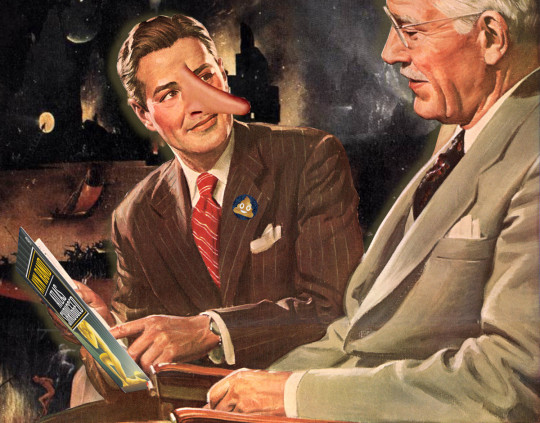
Next Tuesday (Oct 31) at 10hPT, the Internet Archive is livestreaming my presentation on my recent book, The Internet Con.

There are six lies that corporations have told since time immemorial, and Nick Hanauer, Joan Walsh and Donald Cohen's new book Corporate Bullsht: Exposing the Lies and Half-Truths That Protect Profit, Power, and Wealth in America* provides an essential taxonomy of this dirty six:
https://thenewpress.com/books/corporate-bullsht
In his review for The American Prospect, David Dayen summarizes how these six lies "offer a civic-minded, reasonable-sounding justification for positions that in fact are motivated entirely by self-interest":
https://prospect.org/culture/books/2023-10-27-lies-my-corporation-told-me-hanauer-walsh-cohen-review/
I. Pure denial
As far back as the slave trade, corporate apologists and mouthpieces have led by asserting that true things are false, and vice-versa. In 1837, John Calhoun asserted that "Never before has the black race of Central Africa, from the dawn of history to the present day, attained a condition so civilized and so improved, not only physically, but morally and intellectually." George Fitzhugh called enslaved Africans in America "the freest people in the world."
This tactic never went away. Children sent to work in factories are "perfectly happy." Polluted water is "purer than the water that came from the river before we used it." Poor families "don't really exist." Pesticides don't lead to "illness or death." Climate change is "beneficial." Lead "helps guard your health."
II. Markets can solve problems, governments can't
Alan Greenspan made a career out of blithely asserting that markets self-correct. It was only after the world economy imploded in 2008 that he admitted that his doctrine had a "flaw":
https://www.pbs.org/newshour/show/greenspan-admits-flaw-to-congress-predicts-more-economic-problems
No matter how serious a problem is, the market will fix it. In 1973, the US Chamber of Commerce railed against safety regulations, because "safety is good business," and could be left to the market. If unsafe products persist in the market, it's because consumers choose to trade safety off "for a lower price tag" (Chamber spox Laurence Kraus). Racism can't be corrected with anti-discrimination laws. It's only when "the market" realizes that racism is bad for business that it will finally be abolished.
III. Consumers and workers are to blame
In 1946, the National Coal Association blamed rampant deaths and maimings in the country's coal-mines on "carelessness on the part of men." In 2003, the National Restaurant Association sang the same tune, condemning nutritional labels because "there are not good or bad foods. There are good and bad diets." Reagan's interior secretary Donald Hodel counseled personal responsibility to address a thinning ozone layer: "people who don’t stand out in the sun—it doesn’t affect them."
IV. Government cures are always worse than the disease
Lee Iacocca called 1970's Clean Air Act "a threat to the entire American economy and to every person in America." Every labor and consumer protection before and since has been damned as a plague on American jobs and prosperity. The incentive to work can't survive Social Security, welfare or unemployment insurance. Minimum wages kill jobs, etc etc.
V. Helping people only hurts them
Medicare will "destroy private initiative for our aged to protect themselves with insurance" (Republican Senator Milward Simpson, 1965). Covid relief is unfair to people that are currently in the workforce" (Republican Governor Brian Kemp, 2021). Welfare produces "learned helplessness."
VI. Everyone who disagrees with me is a socialist
Grover Cleveland's 2% on top incomes is "communistic warfare against rights of property" (NY Tribune, 1895). "Socialized medicine" will leave "our children and our children’s children [asking] what it once was like in America when men were free" (Reagan, 1961).
Everything is "socialism": anti-child labor laws, Social Security, minimum wages, family and medical leave. Even fascism is socialism! In 1938, the National Association of Manufacturers called labor rights "communism, bolshevism, fascism, and Nazism."
As Dayen says, it's refreshing to see how the right hasn't had an original idea in 150 years, and simply relies on repeating the same nonsense with minor updates. Right wing ideological innovation consists of finding new ways to say, "actually, your boss is right."
The left's great curse is object permanence: the ability to remember things, like the fact that it used to be possible for a worker to support a family of five on a single income, or that the economy once experienced decades of growth with a 90%+ top rate of income tax (other things the left manages to remember: the "intelligence community" are sociopathic monsters, not Trump-slaying heroes).
When the business lobby rails against long-overdue antitrust action against Amazon and Google, object permanence puts it all in perspective. The talking points about this being job-destroying socialism are the same warmed-over nonsense used to defend rail-barons and Rockefeller. "If you don't like it, shop elsewhere," has been the corporate apologist's line since slavery times.
As Dayen says, Corporate Bullshit is a "reference book for conservative debating points, in an attempt to rob them of their rhetorical power." It will be out on Halloween:
https://bookshop.org/a/54985/9781620977514

If you'd like an essay-formatted version of this post to read or share, here's a link to it on pluralistic.net, my surveillance-free, ad-free, tracker-free blog:
https://pluralistic.net/2023/10/27/six-sells/#youre-holding-it-wrong
#pluralistic#corporate bullshit#lies#books#reviews#taxonomies#labor#denialism#consumerism#Nick Hanauer#Joan Walsh#Donald Cohen#history#object permanence#taking the right seriously
834 notes
·
View notes
Text
D&D's Obsession With Taxonomy
Like virtually everybody else in the TTRPG space I downloaded One D&D's playtest document to see what the fuss was.
One of the eyebrow-raising bits in that document is the boxed text titled "Children Of Different Humanoid Kinds":
"For example, folk who have a human parent and an orc or an elf parent are particularly common. Many other combinations
are possible ... Finally, determine the average of the two options’ Life Span traits to figure out how long your character might live. For example, a child of a halfling and a gnome has an average life span of 288 years."
Many people have problems with this passage. I can see why. But when I read it I laughed.
Of course D&D would handle this thing this way.
"Determine the average of the two options' Life Span traits to figure out how long your character might live"; the ludicrous math precision of "288 years"?
These bits are quintessential D&D.
+
"D&D is racist!" discourse returns again and again, like a pair of annoying missionaries.
(I've used this metaphor before. I'm pleased with it. I will repeat it as often as people repeat "D&D is racist!" discourse online.)
But a conversation that Flo began on Discord about the thoul has given me a way to talk about "D&D is racist!" in a way that doesn't bore me.
+
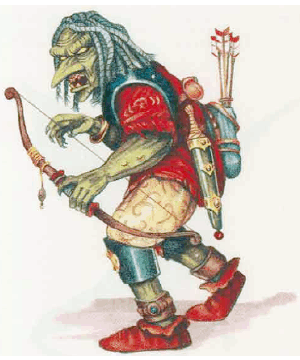
What is a thoul?
"Thouls are magical crosses between ghouls, hobgoblins, and trolls. In spite of their ghoulish blood, they are living creatures, not undead."
Gus points out that "thoul" is likely a typo -- "transcription error (first use of thouls replaces 'toads' as entry above 'ghouls' on table transferred from Monsters and a treasure to ready ref sheets)"
(Here's a fun link about the thoul's possible origins.)
The Discord conversation descends into laughter.
Flo: "I think D&D does not need as many humanoids as it has."
+
Here's my thought:
D&D is racist
is really:
D&D is obsessed with taxonomy
which is really:
Nerds are obsessed with taxonomy
+
People arguing over the differences between a wyvern and a dragon; or
People insisting that Tolkien made a categorical distinction between orcs and goblins (no, he did not, go read "Lord of the Rings" again); or
People arguing about whether "Star Wars" is science fiction or science fantasy, and then arguing about the boundaries of science fantasy; or
What Are The Differences Between High Fantasy And Low Fantasy
Etc, etc, etc.
All of the above cliche-nerd-arguments are about more-or-less arbitrary distinctions. The utility of these categories tend to be vastly overblown.
+
Categories are useful.
There is a distinction between performance art and the performing arts because they arise from separate traditions; ditto the many strains of music genre.
But these are useful precisely because they communicate a history of people exercising agency -- creators choosing to define themselves in relation to history / tradition / peers, letting those things define their work.
Categories are subjective actions, not objective facts.
+
What the nerd approach to taxonomy ("a dragon is NOT a wyvern!!!") does well is make a field of knowledge / phenomena predictable, quantifiable: "This is the way the world is."
Therefore fully understandable: "I know the world."
Therefore possible to act on: "I know what do with the world."
You can solve it, apply best practices to it, optimise it, own it, possess it.
Definitive taxonomies like "goblin / hobgoblin / bugbear" is better for you because then you can shorthand these creatures into three separate and discrete scripts.
Instead of: "goblin people come in a lot of different sizes -- some are big, some are puny, some are kind, some are not -- it all depends. You got to just pay attention to each one."
Which makes things messier, more unpredictable, meaning you have to pay attention, exercise discretion / empathy more, possibly accommodate new perspectives.
"I know the bugbear better than it knows itself, I got this."
vs
"Okay so how do I get to know Ms Goblin better?"
+
When I posted these thoughts to Discord, Marcia observed:
"The connection between taxonomy and power, that nerds find it empowering to possess an abstract knowledge which they impose onto things, seems related to what has been identified as phallic desire ..."
(Meaning that this blogpost should really be titled D&D's Obsession With Phallic Desire , for maximum clickbait -- but this is Marcia's thought, don't wanna steal her thunder!)
+
One advantage to quantifiable, objective, abstracted taxonomies in games:
It helps with logistics in play.
The mental load for players in TTRPGs is already so high -- at least it is for me, weak-brained nerd as I am; I need some shorthand just to help my imagination along.
BUT!
If helping with mental load was the purpose for D&D obsessive taxonomy -- it'd be way simpler than it now is???
Tracking all the split hairs between D&D FINAL EDITION's ten thousand different Conditions is empathically not making play easier.
+
Back to the thoul. Gus again:
"Thouls - my take is they are interesting as a set of mechanics - but incoherent as a creature. The need to justify their abilities via existing monsters makes then nonsensical- better just to have them be some sort of manifestation of goblin magic or science ... That D&D chose instead to taxonomize them says something about D&D."
+
The thoul's "part ghoul, part troll, part hobgoblin" thing is much like the "half-dradkin half-celestial ranger 5 / paladin 7" NPCs you see in mainstream RPG adventure-path-type books.
Which is much like: "determine the average of the two options’ Life Span traits" and "288 years".
Aesthetically and ethically incoherent; mechanically convoluted -- but absolutely sensical if your purpose is to safeguard access to a highly taxonomised "objective" worldview.
Nerds don't mind figuring out complicated fractions of abstract objective absolutes. Because this means you can still ultimately sort reality into absolutes.
You can still grasp (in all senses of the word) the world.
That thought is safer / more advantageous than: "yeah you just gotta deal with things being a messy soup, people are not lines of code, you gotta pay attention to everything in its own context."
+
This is turning out to be a post assisted by Discord chorus.
Re: the drive for taxonomy-based worldbuilding -- and concurrent to thoughts about how Non-Diegetic Objective Maps Are Naff Actually -- Ava:
"the whole "fantasy worldbuilding, with its concrete ontologies and god's eye histories and maps replicates + reifies colonial epistemology" was the whole deal of my thesis."
(Ava you need to write a blogpost about this thesis!)
Re: literal scientific taxonomy -- Dan:
"D&D's obsession with taxonomy is weirder to me than normal taxonomic obsessions because of how hard it tries to ape natural sciences and then leaves out every possible interesting thing actually studying ecology could lead to."
Which sparked a discussion about the politics of binomial nomenclature, how there's a great deal of re-classification going on in scientific fields.
Syd:
"there’s actually been a lot of big reshuffles that have come out of the fact that people realized certain classifications had been from phenotypical similarities (physical characteristics) but not genotípicas relationships. And even when it isn’t political in the sense of changing names that we’re given as honorifics there’s actually a huge pushback just from people who think it shouldn’t change bc that’s historically how it was, even if it doesn’t fit our current models of what taxonomy is actually useful for in ecology and biology."
Something something, categories are subjective actions, not objective facts, something something.
Flo, with the final word:
"It's the same thing that gives the Internet sandwich discourse.
'Is x a sandwich?' A sandwich is not an objective fact. A sandwich is an idea. A sandwich is a category we choose to make."
+
( Image source: https://dmdavid.com/tag/the-strange-mystery-of-the-dd-monster-called-a-thoul/ )
130 notes
·
View notes
Text
Psst. Want to try out trope tagging for published fiction?
My MLIS Capstone team's project is live. We are asking: can we crowdsource a vocabulary for published fiction that addresses all* the ways people want to search, and manage it via an AO3-like tag wrangling workflow?

Like... not bad? And getting better, as people add tags.
(more details and screenshots under the cut)
Here are my tags for Check, Please! vol. 1:
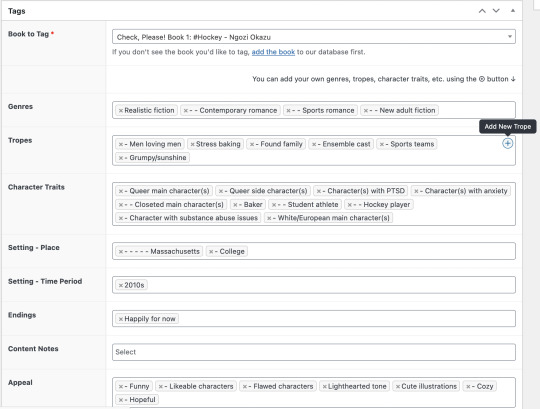
And someone else just added "fish out of water," and I'm like oh, gotta go add that... and found family... and isn't Jack bisexual?... and... okay, I have to get some other work done today. You can lose a lot of time in this thing.
The search is very much based on AO3's:
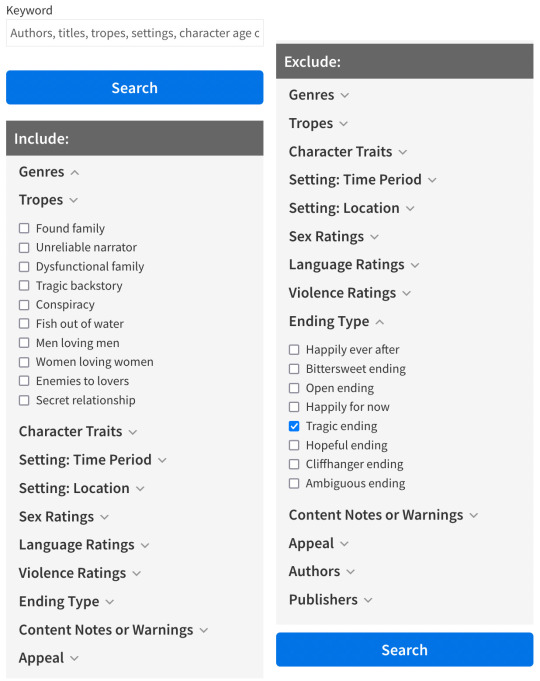
*People really want to search by author demographics, but this is a short-term class project, and we didn't think we could ethically implement demographic tags for real people in the time we had.
Got a minute? Try it out!
If you'd like to participate, there's a brief research privacy agreement (your tags become visible, but they're not connected to your username and nothing about you is visible to other users on the site, only the research team) and then you can sign up.
If you have some time, we'd love to have more data. You might see some messy or incorrectly filed tags--that's okay. We're wrangling them as they come in. We might work on hiding newly-added tags until they've been reviewed if it gets to be too much.
Once you've entered a tag set, you can leave comments on it and tell us what you think. Are our categories more or less okay? Are we missing something? Is there a tag you think is misfiled?
This is just a demo.
This is an academic research project; it's not intended to be the new Goodreads or StoryGraph. (We love StoryGraph. I am a StoryGraph librarian. It's great.) We just wanted to explore what it would take to build the kind of search filters for published fiction that AO3 gives us for fanfic.
(A lot. It's a lot. Don't ask me how much sleep I've gotten for the last couple of months. And if you're curious on how I put this together, I wrote up a quick list of the WordPress plugins that went into it, which I'll expand later after I've had a nap. (WordPress??! yeah. I'm a WordPress developer. If I could have learned Ruby in a couple of months and forked AO3, believe me, I would have. It's a little awkward because you have to put in books separately and then enter your tags on a separate screen. Look, if I had infinite time and an actual budget...))
#dispatches from grad school#fiction#tagging#ao3#taxonomies#books#storygraph#goodreads#omgcheckplease
131 notes
·
View notes
Text
Being autistic is weird because I think I'd be entirely entirely immune to the maddening effects of witnessing an Elder God but learning that barnacles are arthropods rather than molluscs nearly gave me an existential crisis
13K notes
·
View notes
Photo

#Information Architecture (IA) the #classification of #information A simple website may only include 8 top level pages, 50 secondary and perhaps only 300 tertiary labelled (taxonomy) navigation elements, that’s only 358 entities. However, Information #AgileWorldInc #AgileTransformation #AgileFinOps #LeanPortfolioManagement https://agile-world.us/information-architecture-ia-the-classification-of-information/?utm_source=tumblr&utm_medium=%23AgileWorld&utm_campaign=%23AgileWorld
#karlsmithuserexperienceu#AgileWorld#AgileWorldUSA#digitalproductisation#digitalproductization#IA#Informationarchitecture#ontology#taxonomies
0 notes
Text
youtube
TODAY IN PHILOSOPHY OF HISTORY
Hill and Sorokin: An Addendum on Theoretical History
Christopher Hill said that seventeenth century England was a century of revolution, fighting over two conceptions of civilization; Pitirim Sorokin said that the crisis of the twentieth century was a transition from one kind of cultural system into another. Both appeal to taxonomies of social formations, Hill implicitly and Sorokin explicitly. Can history grow into a discipline in which we can make abstract and theoretical claims about history? Can there be a scientific research program in history to bring development such as the taxonomies of Hill and Sorokin to maturity?
Quora: https://philosophyofhistory.quora.com/
Discord: https://discord.gg/r3dudQvGxD
Links: https://jnnielsen.carrd.co/
Newsletter: http://eepurl.com/dMh0_-/
Podcast: https://podcasters.spotify.com/pod/show/nick-nielsen94/episodes/Hill-and-Sorokin-An-Addendum-on-Theoretical-History-e2fh3mp
#philosophy of history#Pitirim Sorokin#Christopher Hill#philosophy of science#taxonomies#Karl Popper#Youtube
0 notes
Text
Below the poll is a series of animal images labeled A through J. A is the least close to the birds we have today; J is the closest. If you encountered these animals in the wild, which would you call birds? If you pick a higher up option, then that means you consider all the below ones birds as well - so if you pick A, then BCDEFGHIJ are all birds. If you pick J, only J is a bird.
A:

B:
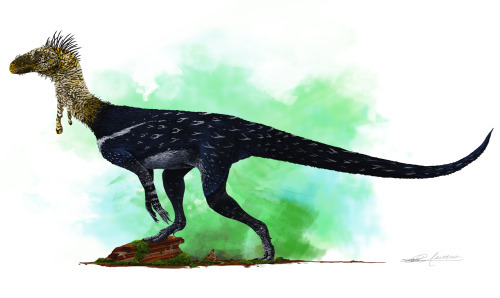
C:
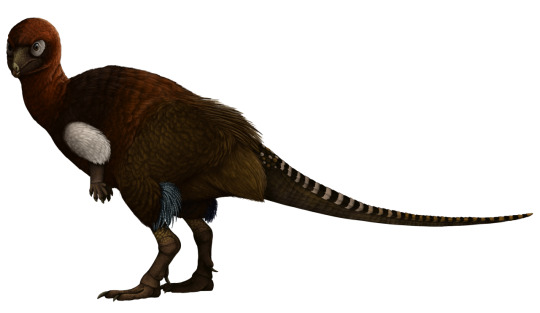
D:

E:
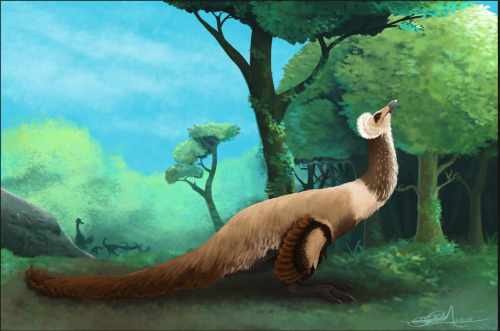
F:
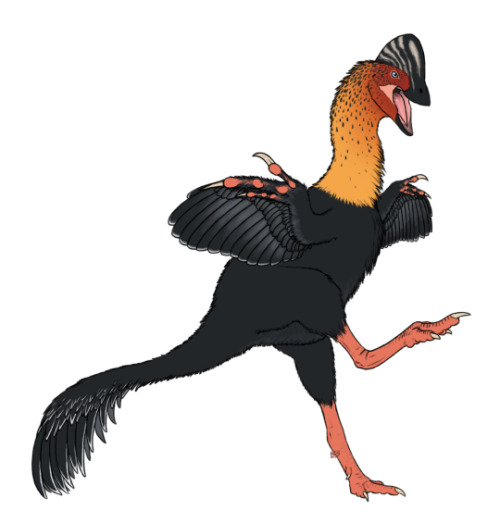
G:

H:
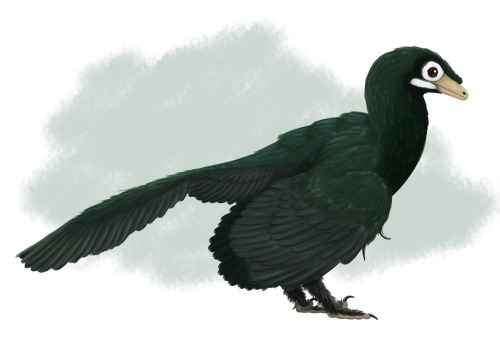
I:
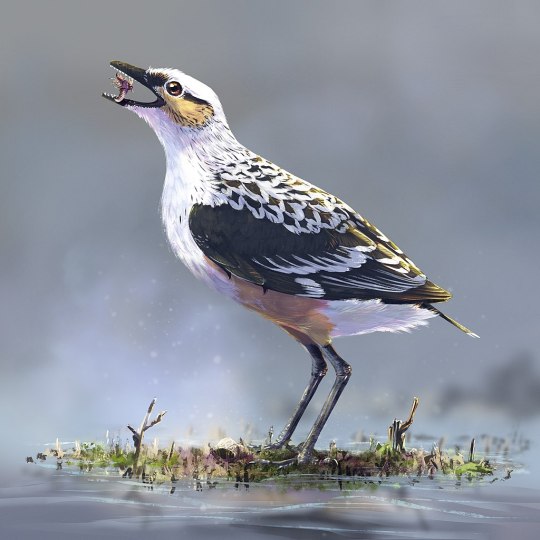
J:
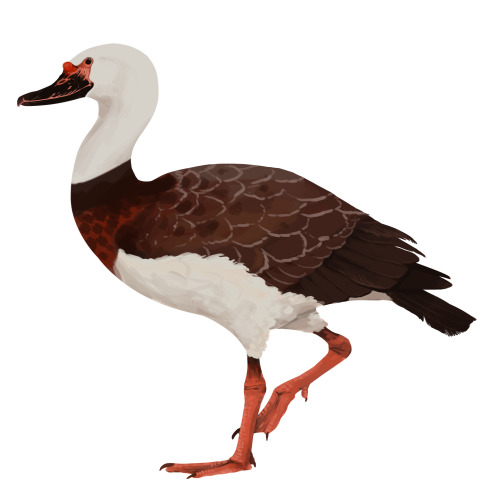
PLEASE REBLOG THIS SO IT CAN LEAVE PALAEOBLR. I NEED PEOPLE WHO DON'T RECOGNIZE THESE ANIMALS ON SIGHT TO VOTE.
I apologize to all of y'all with vision impairments for whom this poll is inaccessible. Alas, this is an experiment, and I cannot name the taxa. Thank you.
All alt text includes artist attribution; I did not make these pictures myself.
#palaeoblr#dinosaurs#birds#pterosaurs#prehistoric life#WHAT ARE BIRDS#bird political spectrum#taxonomy#classification#cladistics#phylogenetics
19K notes
·
View notes
Text
some other taxonomic facts for you to get mad at evolution for, instead of "birds are dinosaurs"
"Insects are Crustaceans" (Pancrustacea)
"Dolphins are Hoofed Mammals" (Artiodactyl)
"Mushrooms are closer to Animals than they are to Plants" (Opisthokont)
"Hyenas are Cat-like" (Feliformia)
"Herpetology is a LYING BASTARD since Amphibians are equally close to Mammals and Reptiles, and there's no reason it should be included like that. if anything, Herpetology should be a parent science of Ornithology, since birds are reptiles. why the fuck are toads here??" (Amniota, Sauria)
"really, we're all just fish" (Sarcopterygii)
11K notes
·
View notes
Text
ACF 6.1 Adds Support for Registering Custom Post Types and Taxonomies – WP Tavern
ACF (Advanced Cultural Center) version 6.1 It was released this week with support for creating Custom Post Types and Taxonomies. This is a long-awaited feature that users have been asking for since the first days of the plugin when its original author, Elliot Condon, was still developing it.
When Sweet Brains received the plugin, the ACF community echoed this feature request. WP Engine put it on…

View On WordPress
0 notes
Note
I'm sorry... snake paper? Are things heating up in the snake researcher fandom?
16 February 2024: A team of researchers (including a generally well-respected anaconda expert) found minimal and partly contradictory genetic differences in green anacondas over an enormous area, summarily dismissed all previous work on the taxonomy of green anacondas, and gave the mitochondrial lineage concerned a new name, along the way making some huge fumbles that show plainly that they have no idea how taxonomy works or what certain technical terms mean. They published the work in a journal from a suspect publishing house that is known to rush, skip, or ignore peer review as and when it suits them. And apparently there was some suspicious funding involved, though I don’t know much about that. They made a media storm with ‘a new anaconda!’ but within minutes there were people raising huge red flags about the paper, for the reasons enumerated above and others.
The response from ‘the community’ has been swift and harsh, but mostly fair, in my view. The discussion on ResearchGate reflects this pretty well. There are some bad takes about keeping ‘wokism’ out of science; I would argue that it remains critical to incorporate native peoples, knowledge, and languages into taxonomic work—just not the way this was done, in flagrant and intentional conflict with the established methods and protocols. There are also responses in the discussion by the lead author that show that he is evidently impervious to all of this criticism, and stands by the belief that the work and taxonomic reasoning is sound.
19 March 2024: two papers were published simultaneously in Bionomia, that both enumerate and rebut the problems of the original paper. And I know there are more on the way, though I don’t know if they are all going to be completed now that two responses have already been published.
The one thing I would weigh in on from my perspective is that it is the *taxonomy*, and not necessarily the evidence presented in the paper, that is the biggest problem. Species are described based on mitochondrial data alone all the time. Some of the results are quite interesting. But the taxonomy of the paper is a mess, full of contradictions, cherry-picking, and terminological errors. In the hands of competent taxonomists, the work might have been much more difficult to dispute. But also, no competent taxonomist would have assigned a new name to this lineage; there are too many existing names that would have priority, if it is worth recognising.
Undoing public perception of there being a new anaconda species will take years, if it can ever really be achieved. Always easier for media stories to go around than corrections.
TL;DR big snake paper made big mistakes, and within a month was dismissed. It has probably done lasting damage to perception of anaconda diversity.
2K notes
·
View notes
Text
On the one hand, it's true that the way Dungeons & Dragons defines terms like "sorcerer" and "warlock" and "wizard" is really only relevant to Dungeons & Dragons and its associated media – indeed, how these terms are used isn't even consistent between editions of D&D! – and trying to apply them in other contexts is rarely productive.
On the other hand, it's not true that these sorts of fine-grained taxonomies of types of magic are strictly a D&D-ism and never occur elsewhere. That folks make this argument is typically a symptom of being unfamiliar with Dungeons & Dragons' source material. D&D's main inspirations are American literary sword and sorcery fantasy spanning roughly the 1930s through the early 1980s, and fine-grained taxonomies of magic users absolutely do appear in these sources; they just aren't anything like as consistent as the folks who try to cram everything into the sorcerer/warlock/wizard model would prefer.
For example, in Lyndon Hardy's "Five Magics" series, the five types of magical practitioners are:
Alchemists: Drawing forth the hidden virtues of common materials to craft magic potions; limited by the fact that the outcomes of their formulas are partially random.
Magicians: Crafting enchanted items through complex manufacturing procedures; limited by the fact that each step in the procedure must be performed perfectly with no margin for error.
Sorcerers: Speaking verbal formulas to basically hack other people's minds, permitting illusion-craft and mind control; limited by the fact that the exercise of their art eventually kills them.
Thaumaturges: Shaping matter by manipulating miniature models; limited by the need to draw on outside sources like fires or flywheels to make up the resulting kinetic energy deficit.
Wizards: Summoning and binding demons from other dimensions; limited by the fact that the binding ritual exposes them to mental domination by the summoned demon if their will is weak.
"Warlock", meanwhile, isn't a type of practitioner, but does appear as pejorative term for a wizard who's lost a contest of wills with one of their own summoned demons.
Conversely, Lawrence Watt-Evans' "Legends of Ethshar" series includes such types of magic-users as:
Sorcerers: Channelling power through metal talismans to produce fixed effects; in the time of the novels, talisman-craft is largely a lost art, and most sorcerers use found or inherited talismans.
Theurges: Summoning gods; the setting's gods have no interest in human worship, but are bound not to interfere in the mortal world unless summoned, and are thus amenable to cutting deals.
Warlocks: Wielding X-Men style psychokinesis by virtue of their attunement to the telepathic whispers emanating from the wreckage of a crashed alien starship. (They're the edgy ones!)
Witches: Producing improvisational effects mostly related to healing, telepathy, precognition, and minor telekinesis by drawing on their own internal energy.
Wizards: Drawing down the infinite power of Chaos and shaping it with complex rituals. Basically D&D wizards, albeit with a much greater propensity for exploding.
You'll note that both taxonomies include something called a "sorcerer", something called a "warlock", and something called a "wizard", but what those terms mean in their respective contexts agrees neither with the Dungeons & Dragons definitions, nor with each other.
(Admittedly, these examples are from the 1980s, and are thus not free of D&D's influence; I picked them because they both happened to use all three of the terms in question in ways that are at odds with how D&D uses them. You can find similar taxonomies of magic use in earlier works, but I would have had to use many more examples to offer multiple competing definitions of each of "sorcerer", "warlock" and "wizard", and this post is already long enough!)
So basically what I'm saying is giving people a hard time about using these terms "wrong" – particularly if your objection is that they're not using them in a way that's congruent with however D&D's flavour of the week uses them – makes you a dick, but simply having this sort of taxonomy has a rich history within the genre. Wizard phylogeny is a time-honoured tradition!
#gaming#tabletop roleplaying#tabletop rpgs#dungeons & dragons#d&d#worldbuilding#taxonomy#phylogeny#media#literature#history#literary history#death mention
3K notes
·
View notes
Text
Big news for bird names: American Ornithological Society to replace eponyms
AOS intends to change all offensive and eponymous (named after people) common names of birds in the USA and Canada.
Renaming these species will be done with involvement of the public and overseen by a new committee made up of ornithologists, social scientists, and communications and taxonomy experts.
AOS will work with the ornithological societies of Central and South America determine who in these regions will maintain stewardship of common English names.
AOS announcement: https://americanornithology.org/about/english-bird-names-project/american-ornithological-society-council-statement-on-english-bird-names
More information under the cut.
How do bird names work? Scientific names (binomials like Zonotrichia albicollis) are set by the International Commission on Zoological Nomenclature. These names are meant to be unique, unchanging, and universally recognized. Common names, on the other hand, are more fluid. The American Ornithological Society is the recognized authority on English-language common names for North American birds, published in their annual Checklist.
The larger context. Ornithologists name birds after people to commemorate those individuals, but this create problems. What do you do when a common name is racist, or when a bird is named after someone who, frankly, sucked? AOS has changed bird names for both of these reasons already.
In 2000 AOS changes the common name of Clangula hyemalis from a racist word for Native women to Long-tailed Duck (although at the time, they denied it was because of "political correctness")
2021: AOS changes the common name of Rhynchophanes mccownii from McCown's Longspur to Thick-billed Longspur. McCown was a Confederate. The push to rename this bird was a flashpoint in the #birdnames4birds movement.
Why not decide one-by-one? Sometimes it's obvious. For example, John James Audubon was a grave-robbing, slave-owning racist; birds such as Audubon's Oriole and Audubon's Shearwater are named after him. Although the National Audubon Society has voted to keep their name ("won't someone consider the branding"), many chapters have changed their names, e.g. the Chicaco Bird Alliance. Other individuals with birds named after them are less well-known or clear-cut in how much they did or did not suck. Removing all eponyms, rather than debating who sucks on a case-by-case basis, will cut down on the arguments.
How will this actually happen? It's not yet clear. Any free-for-all-poll might result in some Birdy McBirdFaces. No timeline either. But it sounds like this really is happening!
4K notes
·
View notes
Text
Scott Pilgrim Taxonomy
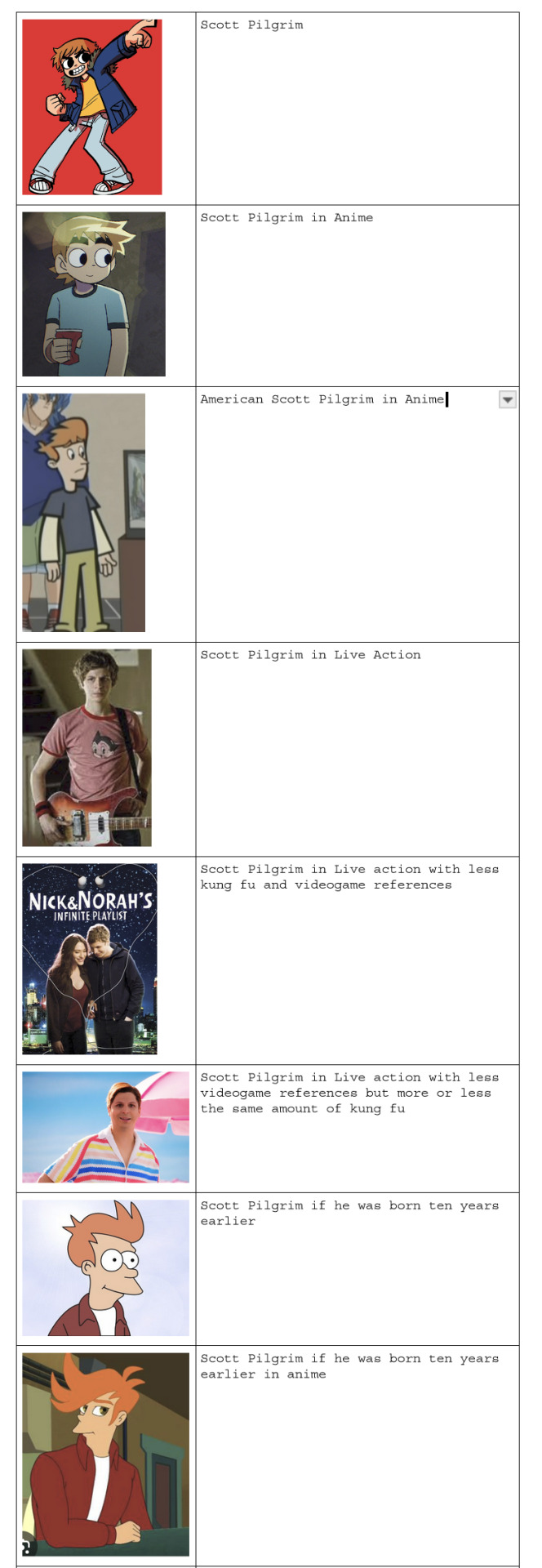


#Scott Pilgrim#Scott Pilgrim Takes Off#Scott Pilgrim vs the World#Bryan Lee O Malley#Taxonomy#Kappa Mikey#Barbie#The Barbie Movie#Micheal Cera#Futurama#neil cicierega#Neil Young#Jack Stauber#shitpost#bee and puppycat spoilers
2K notes
·
View notes
Text
Teaching 5-year-olds about animal classification, fingernails dug into my palms, jaw clenched, just barely holding back telling them about how fish are fake fish are fake fish are fake
6K notes
·
View notes
Text
in zoology, animal species are given standard "latin" names consisting of two words, the genus name and the species name. typically, the genus name is a noun, and the species name is an adjective. following the rules of latin grammar, adjectives need to agree with nouns with grammatical gender, so if the genus name is a feminine latin noun then all species of that genus are given (in principle) adjectives marked with feminine latin suffixes.
in practice of course, new genus names don't always use actual latin words, so these latin grammatical gender rules need to be grafted onto words that aren't really latin. and this is where one of the weirdest conventions of zoological binomial nomenclature comes in!
how exactly do you determine what the latin grammatical gender of a word is if it isn't a latin word? according to the ICZN, it's simple:
if the word is from greek, use its gender in greek
otherwise, if the word is from a modern european language with grammatical gender that uses the latin alphabet, use the gender in the source language (yes it is that specific)
otherwise, if the name ends with -a it's feminine
otherwise, if the name ends with -um, -u, or -o it's neuter
otherwise, it's masculine
unless of course if the zoologist with naming dibs says explicitly that they think this genus should have an irregular gender.
anyway these rules are fascinating to me. why are they this specific? grammatical gender systems compatible with latin's adjective suffixes are found throughout the entire indo-european language family, so why restrict it to modern european latin-script languages (and greek)? I don't know!
1K notes
·
View notes